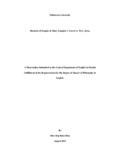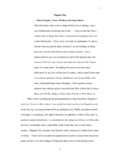Please use this identifier to cite or link to this item:
https://elibrary.tucl.edu.np/handle/123456789/635| Title: | Rhetoric of Empire in Mary Kingsley’s Travels in West Africa |
| Authors: | Rana Bhat, Shuv Raj |
| Keywords: | Literary criticism;Literary History;Travel Writing;Imperial eyes |
| Issue Date: | Aug-2012 |
| Publisher: | Central Department of English |
| Institute Name: | Central Department of English |
| Level: | M.Phil. |
| Abstract: | In this dissertation, I provide an analysis of Travels in West Africa by Mary Kingsley that falls within the genre of travel writing, currently a flourishing and highly popular literary genre. Moving away from Kingsley’s insistence on her real or authentic experience during her sojourn in West Africa, I argue that her visit to Africa is motivated by imperial ambition which is evidenced in the rhetoric that threads the text, particularly imperial stylistics, rhetorical tropes and racist discourse. To show this colonial thinking, I accept Mary Louise Pratt’s and David Spurr’s invitations in Imperial Eyes and The Rhetoric of Empire respectively to employ their critical reading strategies to investigate European /British ethnographic discourses of African cultures. In addition to these, I also draw on the methodology of the discourse historical approach developed by Martin Reisigl and Ruth Wodak to explore the development of racialized constructions of West African identity. Contrary to Kingsley’s claim on factual accuracy of her work, my findings show that Africa is negatively constructed as a land to be surveyed, debased, appropriated, negated and conquered by the European power particularly British. Moreover, Africans are constructed as savage, capricious, inferior and undeveloped, clearly justifying British intervention. Many a time, the Africans are defined in terms understandable to the British, fitting them within a scheme that is knowable and acceptable within ethnocentric British ideology. These findings lead me to draw the conclusion that imperial ideology is embedded in the very language the colonizers use. In other words, language is not a neutral entity, carrying transparent meanings but is charged with ideology. |
| URI: | http://elibrary.tucl.edu.np/handle/123456789/635 |
| Appears in Collections: | English |
Files in This Item:
| File | Description | Size | Format | |
|---|---|---|---|---|
| cover.pdf | 25.34 kB | Adobe PDF |  View/Open | |
| Chapter.pdf | 214.46 kB | Adobe PDF |  View/Open |
Items in DSpace are protected by copyright, with all rights reserved, unless otherwise indicated.
